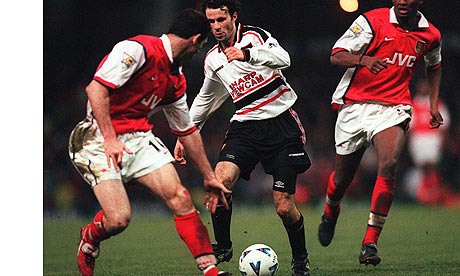
So that was the Noughties. "I don't want to see you again until the next century," Kevin Keegan told his England players exactly 10 years ago, after they had managed to lose to Scotland at Wembley in their final fixture of the millennium and reach Euro 2000 by the skin of their teeth. One trusts Fabio Capello's parting message to his players this weekend will be slightly more cordial, and that at next year's tournament performances will be better than the ones Keegan managed to supervise.
Also 10 years ago this month, Brian Kidd was sacked by Blackburn after managing to miss out on Manchester United's famous 1999 treble success. And when Leeds slipped below the newly knighted Sir Alex Ferguson's team in the Premiership table after a 2-0 defeat at Wimbledon ended a 13-match unbeaten run, David O'Leary said the Uefa Cup trip to Moscow had taken a lot out of his players.
Back in the present Leeds find themselves the star attraction of the second round of the FA Cup, the somewhat fallen giants Kettering aim to kill. But at least both teams can dream of drawing Manchester United in the third round, which was not the case in 1999. Ten years ago, for reasons widely ridiculed at the time and best forgotten now, the holders were persuaded not to defend their trophy and meekly acquiesced in a half-baked scheme that automatically put any chance of repeating the treble on hold.
As it happens, Real Madrid held a treble veto that season anyway, convincingly knocking United out of the Champions League before going on to win the final, yet it is fair to say that since 1999 neither the Cup nor the treble have been quite the same. "I feel sorry for the team that wins the next FA Cup," Lee Hodgkiss of the Independent Manchester United Supporters Association said after his club's withdrawal. "What a hollow victory it will be knowing that the greatest team in Europe weren't taking part."
Those words sounded prophetic when Chelsea almost sheepishly accounted for Aston Villa in the 2000 final, one of the least memorable in the modern era, and goodness knows that's saying something. What Hodgkiss could not have known, and no one else could possibly have guessed, is that at the semi-final stage of the 2009 FA Cup – the very same juncture at which Ryan Giggs's extraordinary goal and Peter Schmeichel's penalty save provided such imperishable memories against Arsenal 10 years earlier - United would voluntarily jeopardise their progress and with it a realistic chance of another treble by fielding a team of reserves that ended up losing to Everton.
This century the Cup has only been of vital importance to teams without anything else to play for, and while this does not necessarily mean top-four sides can never take it seriously – Liverpool in 2006 and Chelsea last season come to mind – it does make one wonder whether the treble will ever be chased again with the commitment and verve United showed in 1999. Prevailing opinion suggests it might be folly to do so, because prioritisation is the new buzzword and the Cup has become such a poor relation that leading clubs are now almost bound to use it as a chance for a rest rather than a shot at glory. Even Ferguson accepts there was an enormous amount of luck on United's side in 1999 and demonstrated by his actions last season that there was a real danger of their bid for the major trophies being sidetracked by the sideshow.
Yet United were sidetracked in Rome anyway, outplayed by a Barcelona team Chelsea had made look inferior in the semi-final. Far from being an anachronism belonging to the last century, the treble is arguably more achievable than ever to teams willing to go for it. There has been an English side in the Champions League final for each of the past five years. There would have been two for the second season running last time but for extremely eccentric refereeing. Squad depth and strength at leading clubs is greater than at any time and last season two Premier League clubs had a treble chance. United blew theirs, Chelsea had theirs blown by an incompetent official. Fair enough, it could be argued Chelsea never had a real chance of winning the league and might have lost in Rome, though they certainly finished the season as a force under Guus Hiddink and the title race might have been tighter had the managerial change been made a few weeks earlier. Who knows what might have happened had Hiddink's Chelsea ever got the chance to play United, a point the Dutch coach was not slow to make after winning the FA Cup.
Carlo Ancelotti's Chelsea have just beaten United to go five points clear at the top and Arsenal are again doing far better than expected, so it is tempting to wonder if London's first ever European Cup might arrive as part of a treble. Tempting, except it is only November. This time last year Chelsea were top of the league and there was not even an African Cup of Nations-shaped cloud in the sky, yet still Luiz Felipe Scolari lost the plot.
Losing players in January could still slow Chelsea down, though they look like a team that can cope. It is true that trebles are trifles only this country considers. You need to have grown up with a traditional reverence for the Cup and key personnel at Stamford Bridge have not. But they are still possible, and if United no longer have the squad or the stomach, Chelsea may be in a position to step up to the plate.

